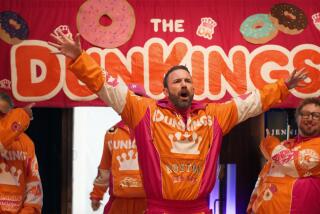A bidding frenzy for search engine keywords during the Super Bowl
When New Orleans takes on Indianapolis at the Super Bowl on Sunday, Brandon Nohara will be sprawled in front of his big-screen TV like millions of others across the nation, drinking beer as friends pack into his apartment.
But Nohara, a marketing analyst for the Bay Area online retailer CafePress, will also be on the job.
Heâll be simultaneously watching the game, listening to his guests and monitoring his laptop, on the hunt for the trendiest phrases of the day, in an effort to win a very different contest: the battle of the search engine keywords.
Nationwide, his competitors will be doing the same -- either manually, like Nohara, or with computer programs. Theyâll be bidding on terms they think large numbers of fans will be entering into search engines such as Google or Bing during the game and its aftermath.
Perhaps âpizza deliveryâ or âMiami weatherâ or the name of a bench-warming player who comes out of nowhere to be a hero. Nohara, for example, plans to bid on âNew Orleans T-shirt.â
The search engines host the auctions. At any given moment, the highest bidder on the word, name or phrase wins the top spot among sponsored links when search results for that term are displayed.
Victory can be fleeting. As soon as someone places a higher bid, he or she gets that top spot.
No matter who wins, the search engines will probably be economic victors.
Search engine advertising is a bright spot in a marketing landscape that has suffered in the recession.
The U.S. advertising market overall was down nearly 14% in 2009, and online advertising was flat, according to data compiled by investment bank Barclays Capital. But search-related spending was up 8%.
Events such as the Super Bowl are gaining importance in that search-advertising marketplace because advertisers can take advantage of weeks of anticipation as consumers prepare for parties or seek stats on their favorite teams.
Super Bowl-related searches are up 40% over this time last year, according to Google advertising-sales executive April Anderson.
And at a time when CBS, the network airing the game, took months to sell its limited inventory of spots in what is one of the most important advertising events of the year, Google and other search engines said their sales are moving at a surprising clip.
âItâs hard to shell out money for 30 seconds for an audience that might be TiVo-ing the thing or walking away from it somehow,â said Nina Lentini, editor of the trade publication Marketing Daily. âTV is not the end-all and be-all anymore.â
Ad prices are set by the advertisers in the bidding process. They pay the search engine only if people actually click on their messages.
The price for each click varies widely, typically from as low as 5 cents to $25 or more, depending on how high the bidding goes.
The pay-as-you-go nature of the business makes it particularly appealing to companies during slow economic times. And unlike television ads, which donât always translate directly into sales, search marketing campaigns show their results in real time.
âWe can look at the campaign after itâs been running for three hours, and if itâs not meeting our goals we can tweak it,â said Sumant Sridharan, head of online acquisitions for CafePress. âWe have a team of analysts who are constantly monitoring performance.â
This yearâs Super Bowl is expected to be an especially rich opportunity for search engines. âWe expect as more advertisers take their campaigns online this year -- whether itâs to save money from advertising on game day or to extend the reach and exposure to an ad during the game -- weâll see an even higher return for search ads,â said Robin Domeniconi, Microsoftâs vice president for U.S. advertising sales.
Dennyâs Corp., which is airing three TV commercials during the Super Bowl, has also bought up keywords âGrand Slam,â âDennysâ and others. Indeed, a Google search on âfree breakfastâ brings up a top sponsored link promoting the restaurantâs post-Super Bowl offer.
The company added online advertising to its Super Bowl ad campaign last year, and it worked so well that it expanded the effort for 2010, said John Dillon, vice president of marketing for the restaurant chain.
Dennyâs is also significantly increasing its presence on social media, including Facebook, Dillon said.
Companies are stepping up efforts to measure the effectiveness of their ads -- analysis that often breaks in favor of the search market, said Wes Nichols, chief executive of the consulting firm Marketshare Partners. He said his company has been hired to track the effectiveness of Super Bowl advertising -- online and on television -- for several of the eventâs big sponsors. The result, he said, could be a smaller television buy or larger online presence for next yearâs game.
âMarketers are spending an inordinate amount of money on the Super Bowl and theyâre constantly questioning whether it makes sense,â Nichols said. âThatâs one of the things that we will be measuring for them.â
sharon.bernstein@ latimes.com






